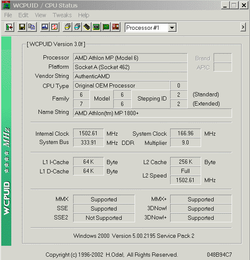Just to specify. The motherboard I got was a Rev 1.4. I called a dozen resellers, when I was shopping for this motherboard 2 or 3 months ago. Several resellers, of course, couldn't or wouldn't reveal the Revision of the motherboard they had in stock, but of those that did, ALL had Rev 1.4. That's what I got and that's what others I have spoken with got, also. The only place I have heard of Rev. 1.3 boards is in the reviews. Every review I have read for the Iwill MPX2 has been a Rev 1.3 board.
I'm not saying that Iwill didn't sell Rev 1.3 boards, they certainly did sell some. Today, however, all you can get is Rev. 1.4, which has NO MULTIPLIER SUPPORT, period, bar none, never.
To me, this is the killer of what might be a great motherboard. I don't feel that it's very practical to run over 150-160 FSB on an MPX motherboard. I don't enjoy formatting and reinstalling Windows because I ran the PCI bus too far out of spec and trashed my hard drive.
On my rig, I have dual XP1600's @ 1800 MHz. I have a MSI K7D, so I run them at 12.5*144 or 12*150.
On the MPX2, I couldn't get near this performance, since the default multiplier is 10.5 and the best I could probably squeeze out the FSB is 160.
10.5*160=1680 MHz.
